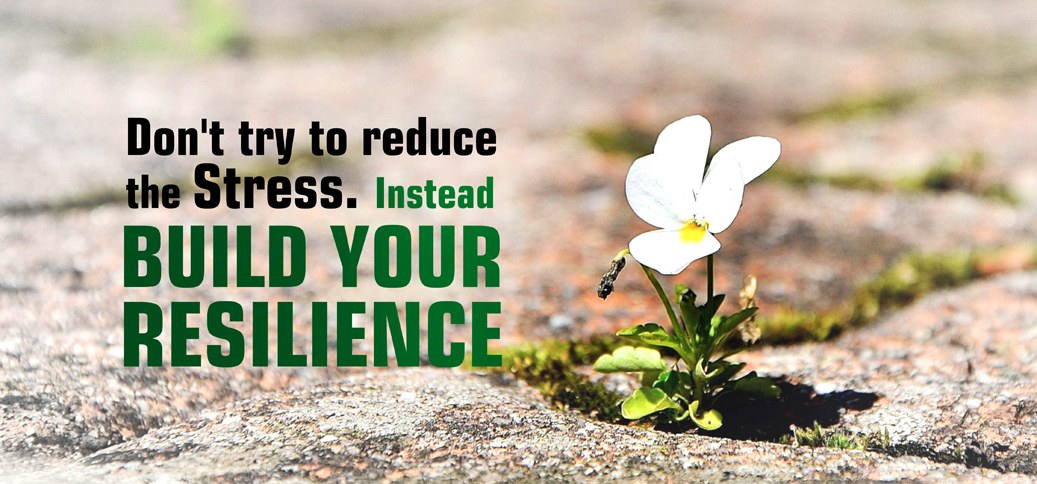Wherever we live, study or work, stress is on the rise. People in developed and developing countries are facing increasing strain at work & in study these days. These include personal and professional challenges, such as global challenges, competition, illnesses, job changes, and organizational restructuring.
For many of us, the initial response to stress is to look for external fixes. We turn to productivity tools or apps that promise to help us manage mounting pressures or we look for ways to alleviate our discomfort: find a different job, hire a new employee to take on an increased workload, or switch careers. But these solutions are often temporary and ineffective. Managing stress over the long-term requires cultivating our own resilience skills before seeking external solutions so that you can turn changes, stresses, and challenges into opportunities. These skills include adaptability, a healthy relationship to control, continual learning, having a sense of purpose, and knowing how to leverage support and appropriate resources.
It’s possible to have too much stress. Pay attention to the early warning signs that you might be burning out whether it’s back pain, headaches, or sleepless nights, short-temperedness or relying more heavily on “comforting habits” like drinking or excessive eating. Become familiar with your own distress signals and take note when occasional signs become more frequent.
Now, to begin to shift the way you deal with stress and cultivate resilience, there are a handful of things we can do right now.
- Reframe how we think about stressHow we perceive stress can be just as important to how we handle it as the amount of stress we’re experiencing. A 2013 Harvard Study also revealed that when researchers told participants that the physiological signs of stress prepared them to cope better they became less anxious and more confident in stressful situations, viewing their stress response as helpful.Shift your focus from eliminating the day-to-day pressures that you face to changing your perception of them. You might ask, “How can I use the energy created by feeling stressed about this new job to better prepare for it?” or “What can I learn from the stress about my increased workload that will help me better prioritize my time?”Don’t forget to add Humor in your talk or conversation. Why to follow only conventional rules? like behave professionally, one cannot laugh in a presentation, put your voice at low pace. Why… Why….? These things make our life boring. You can always go beyond your conventional thinking. Always be humorous & fun loving, crack decent jokes & smile. This will change the whole atmosphere into positive & live.
- Understand the root causesDid you ever take time to reflect on your personal context as well as the larger business and global context? Do it Now to better understand the root causes and possible ways to alleviate and avoid future stress. For instance, did you grow up in a family or a culture where disagreement or conflict was avoided? If so, that’s likely to exacerbate your discomfort and stress when confrontational situations arise. Be aware of your habits and instinctual responses and possibly seek additional support to build skills to more comfortably navigate conflict.
- Link learning with actionWe can choose to see difficult circumstances as learn¬ing opportunities rather than as a time to shut down. When we ask “What can I learn from this?” instead of “Why me?” we can shape the challenge to our advantage.Start by jotting down three possible ways in which you might be able to learn something from the stress you’re experiencing. It might be something related to identifying or managing your emo¬tions, or new interpersonal or technical skills.Remember, Analysis alone isn’t enough. Analysis without action leads to rumination and anxiety. By identifying actions, you can take you’ll be able experiment with solutions and new behaviors and discover productive ways to handle challenges and stress.
- Learn calming techniquesThe most heard Traditional way but the most effective tool. 10 minutes Meditation & relaxation is a Magic. The result is Happy Human Being, Calm & composed, Zero Stress & a lovable person. Meditation is the only way which gives 100% sure shot result of inner peace. Also, it might be breaking the rules of corporate etiquette in your office, listening to calm music in earphones do wonders. It soothes nerves and makes you feel better.By making conscious choices that help us build these skills, we’ll be better equipped to turn our stress and challenges into opportunities. With stronger internal resilience, we can then be proactive and intentional about how we use technology and other external tools to improve the quality of our lives and our work and find solutions to the business, Study, Research, social, and global pressures we face. When it comes to handling stress, start with yourself: we are our own most effective, powerful resource.
(Research Sources: University of Cape town & University of Buffalo)

